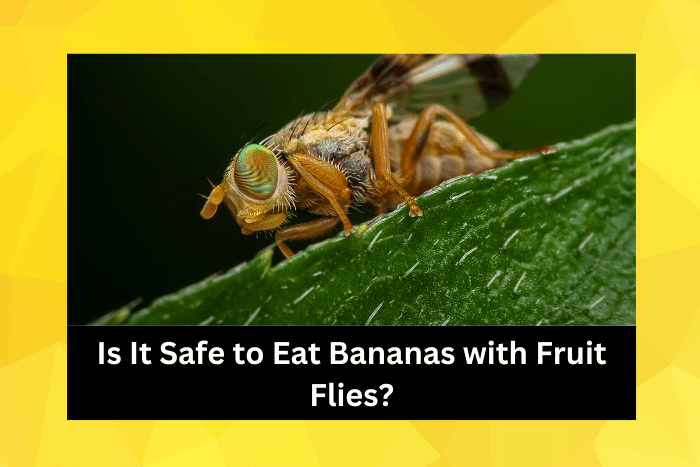Seems to be an obvious question, really, but is it safe to eat bananas with fruit flies?
Well, I personally wouldn’t but is there any scientific reason why you shouldn’t?
What does it mean if your banana has fruit flies?
Why are the flies attracted to your bananas?
Can you just shoo them away and safely tuck into your favorite fruit?
Is there a way of trapping the fruit flies?
Let’s discover the truth and finally answer this perplexing fly question!
It is not recommended to eat bananas that have been infested with fruit flies. The flies can contaminate the fruit with bacteria, which can cause stomach upsets. Fruit flies have no teeth and spit on bananas, meaning that bacteria and viruses can be transferred to them. The flies prefer mature, ripe fruit and will lay their eggs beneath the peel of the banana. Thus, the banana may contain fruit fly larvae. Leaving bananas directly on the kitchen counter leaves them more susceptible to fruit flies. Keeping bananas in the fridge will lessen the chance of infection, as fruit flies prefer a warm environment.
1. Why Are Fruit Flies Attracted to Bananas?
So, what is the main attraction of bananas to fruit flies?
As a banana ripens, its sugar content increases, and this is what attracts the fruit flies.
That is why placing the fruit in the fridge, which slows down the ripening process, can prevent any infestation.
You can also place your bananas under a cake stand or a fly screen.
Putting them in a paper bag has the same effect, but this will also cause the bananas to ripen more quickly.
Believe me, as fruit flies can lay thousands of eggs at a time, it’s not a situation you want to be faced with!
The newly hatched flies are ready to reproduce again within just eight days, so the problem can soon escalate out of control.
It’s not just bananas, any overripe fruit can attract nasty pests carrying their harmful bacteria.
You can find the flies in the most unlikely places, even the bathroom!
They can live in the drains and emerge when they smell the sugar of ripening fruit.

2. Can You Get Rid of Fruit Flies on Bananas?
Prevention is to be encouraged to avoid the occurrence of flies in the first place.
Cleanliness is undoubtedly your first line of defense.
Wash your bananas thoroughly as soon as you get them home.
Even if the bananas have not yet ripened enough to attract the flies, they could have been in contact with other contaminated fruit.
Try and eat the ripest bananas first, rather than leaving them to possibly rot.
Keep your garbage can covered at all times, so the fruit flies are not attracted to the banana peel you have disposed of.
You can spray the flies with a bottle containing 91 percent isopropyl rubbing alcohol which will kill them, but don’t get it on your bananas.
You can also make a simple trap to tempt any lingering flies.
Fill a glass with apple cider vinegar, and cover the top with cellophane, held in place with a rubber band.
Use a toothpick to make tiny holes in the cellophane.
The flies will try and get to the sweet-smelling vinegar and won’t be able to get out of the glass.
Putting this trap near your bananas may keep the flies away from your fruit.
Basil is said to deter flies, but this method is not proven.
However, if this is a herb you enjoy, then there is no harm done in purchasing a basil plant and keeping it near your bananas.
4 Sure Ways to Get Rid of Fruit Flies at Home
Final Thoughts
I guess that’s answered the question of whether is it safe to eat bananas with fruit flies.
As you might expect, the answer is definitely no, as the flies can transmit bacteria, causing stomach upsets.
Now you know that overripe fruit attracts flies, you may wish to keep your banana in the fridge to slow down the ripening process.
Always wash your bananas as soon as possible, and consider using a trap to catch any fruit flies.
Approach your bananas with caution, and if there is an unpleasant swarm buzzing around them, it’s time to throw them away!
If you thought flies were bad enough, how about spiders in your bananas?
